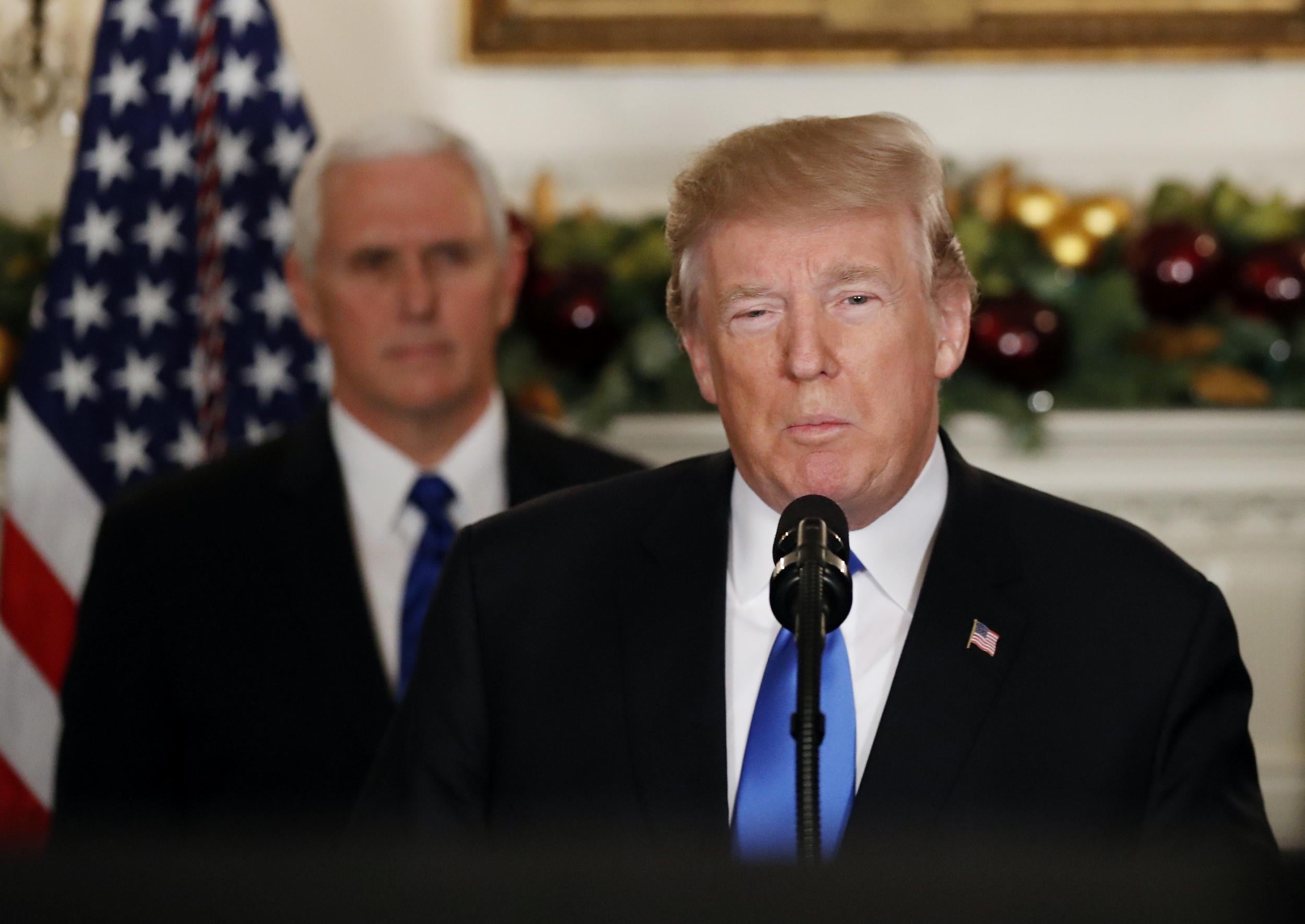Trump’s decision to move the US embassy to Jerusalem is wrong and reckless
Even the most optimistic of observers would be brave to predict that Trump’s proclamation will not spark violence

Donald Trump can have been in no doubt that the reaction to his decision formally to recognise Jerusalem as Israel’s capital would be fiery.
Anger in the Arab world has been mounting all week. The Saudis expressed “deep concern” while the Palestinians’ representative to the UK, Manuel Hassassian, told the BBC the widely-anticipated move would be the “kiss of death” for the Middle East peace process.
The Turkish President’s spokesman suggested that the region and the world would be “plunged into a fire with no end in sight”. European leaders have given varying indications of anxiety; none appear set to follow Mr Trump’s lead.
Certainly it is difficult to see how the decision to recognise Israel’s claim regarding Jerusalem’s status – and to move the American embassy there in due course – will smooth a lasting and peaceable Israeli-Palestinian settlement. On the campaign trail, Mr Trump promised to oversee both things yet it has always been abundantly clear to almost everybody else that the two are mutually exclusive. In the end, it seems that Mr Trump has ignored the concerns of the world and has instead appealed to his base.
The immediate concern will be the effect of the decision in Israel and the occupied Palestinian territories. Even the most optimistic of observers would be brave to predict that it will not spark violence; official travel advice from authorities in France and Germany has already been amended to warn citizens of the possibility of clashes.
If Palestinians will find Mr Trump’s pronouncement shocking and distressing, for the Israeli right it is a dream come true. Ever since the Jerusalem Embassy Act was passed by Congress in 1995, Israeli conservatives have lobbied hard for its implementation. Successive presidents have chosen to use executive powers to postpone any switch from Tel Aviv, cognisant of the potential for it to undermine broader peace efforts.
It is notable that Mr Trump’s intervention follows hot on the heels of the first public statements on the Israeli-Palestinian situation by Jared Kushner, the President’s son-in-law and adviser who in January was tasked with finding a solution to the previously insoluble Middle East conundrum. Not that Mr Kushner’s remarks last weekend were especially enlightening: indeed, it may be that the patent lack of progress towards a peace deal has persuaded Mr Trump to simply throw his lot in with the Israelis.
The other intriguing possibility is that Mr Trump feels the need to shore up his core support because he knows the tentacles of the Mueller inquiry are getting ever closer. The realisation that Michael Flynn may not be loyal to the President appears to have caught the White House somewhat on the hop; the implications may be severe.
Indeed, speculation that Mr Kushner may be identified by Mr Trump’s former National Security Adviser as the man who directed him to make contact with Russian officials last December adds to the feeling that delivering peace in the Middle East is not at the top of his, or the President’s, agenda. Better for them to cut their losses, then – and at the same time distract attention from problems at home. Would the Trump administration be so cynical? You bet.
The President has couched his decision with several caveats, of course. He professes continued support for a two-state solution, for instance. And the final boundaries of the city will, he says, ultimately be determined as part of a future agreement. Yet there is plainly a substantive difference between working out boundaries and determining the city’s status within the parameters of a broader settlement, as was envisaged in the 1993 Israel-Palestinian peace accords.
Likewise, for Mr Trump to argue that he is merely acknowledging “historical and current reality” is an outrageous simplification of the world’s thorniest territorial dispute. What he is doing, at a stroke, is telling the Palestinians that America is firmly on one side of the argument. If the President does not understand this – and cannot appreciate the symbolic importance of his decision – then he is shockingly ill-informed.
If he does understand and is proceeding irrespective of the consequences, then he is something rather worse. Either way, this is an ill-judged and highly dangerous turn of events.
“Kiss of death” sounds about right.
Join our commenting forum
Join thought-provoking conversations, follow other Independent readers and see their replies
Comments